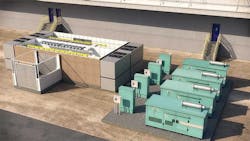Compass EdgePoint Sees Opportunity in Building Better Networks
Chris Crosby has been thinking about the network for a long time. Crosby is the CEO of Compass Datacenters, and as he talks about the evolution of data center industry in 2019, it recalls his assessment from 2016.
“We have some cataclysmic things happening with latency and bandwidth,” Crosby said in a keynote at the 7×24 Exchange in October 2016, in which he laid out the need for edge networks of micro-data centers to manage the growth of devices and the Internet of Things.
“There hasn’t been investment in decades, from a network perspective,” said Crosby. “Now we have a scenario where there are too many potential choke points.”
Fast forward to 2019. Edge computing is the hot new technology on the frontier, and Compass is among the players investing in the next-generation network. Much of the buzz around edge is focused on new tech like driverless cars, or 5G wireless, or augmented reality. But for Crosby, it’s still all about those choke points.
“The care, feeding and monitoring of fiber networks on a backhaul scenario is not sexy, but the economics are significant,” said Crosby. “You have too many ‘Things’ that require a lot of capacity.”
That’s why 2019 will be a year in which boring network infrastructure will drive demand for edge data centers, Crosby predicts. Compass intends to be a player, equipped with modular data center technology from last year’s acquisition of EdgePoint Systems. The Compass EdgePoint effort is being led by Sharif Fotouh, a key member of the Google Fiber infrastructure team prior to founding EdgePoint.
“We’re focusing on industrial applications,” said Fotouh, noting the growing flow of data from sensors in factories, stores and hospitals. “We’re not on the 5G and autonomous car train. 5G is a long way off, and there are a lot of variables that need to be sorted out. Those are likely two to three years out.”
“We’re the anti-hype company,” said Crosby. “We’re working on real stuff. The real killer application right now is avoiding backhaul costs.”
The Edge Also Means Real Estate
Compass Datacenters was founded in 2012 by Crosby, a key player on the Digital Realty team that pioneered the wholesale data center, effectively creating a market for “plug and play” IT space as an alternative to on-premises IT facilities.
Compass’ push into edge computing is part of an ambitious strategy to compete at all levels of the data center business. The company was founded to bring wholesale data centers to regional markets, and recently began targeting huge cloud platforms with a hyperscale data center design.
As edge capacity is needed in new places, Compass’ lengthy expertise in real estate and data center construction is proving valuable.
“These things are not simple,” said Crosby. “In many ways, deploying a shelter requires the same process and approvals and work as building a data center. We have that experience and expertise. There’s a lot of similarities to what Compass has been doing for a long time.”
“We focus on our core competency,” said Fotouh. “We have a lot of expertise with the modular construction side of the business.”
Compass EdgePoint is seeking to strike a tricky balance, creating an edge product that is standardized enough to be repeatable and affordable, while flexible enough to address a wide range of use cases.
Equipping Networks for The Industrial IoT
There will indeed be many use cases in the future, featuring drones, autonomous vehicles, and billions of intelligent “Things.” But for 2019, the Compass team is focused on helping clients solve their network challenges.
Chris Crosby, the CEO of Compass Datacenters, outlines how growing data traffic is placing pressure on network infrastructure during a 2016 talk at the 7×24 Exchange Fall Conference. (Photo: Rich Miller)
“If you’re not focused on what’s super-sexy, there’s still plenty of business,” said Crosby. “There’s a myriad of applications for edge computing. The key is finding hard, credible business drivers.”
“We’ve honed in on a boring old story of bandwidth economics,” said Fotouh. “That’s very different from the discussion we see in the market today.”
It’s a story Fotouh knows well from his time at Google Fiber, when he worked to bring high-speed broadband networks to places like Kansas City, Nashville, Charlotte, Salt Lake City and San Antonio. These are all substantial cities, but Fotouh found their fiber infrastructure lacking compared to the highly-wired major data center markets. He also found that much of the network was engineered to support video (the “Netflix problem”) and poorly suited to data generated by the emergent Industrial Internet of Things (IIoT).
Sharif Fotouh, founder of Compass EdgePoint.
Crosby and Fotouh see a clear profile for this industrial edge. “I think you’re looking at large markets without centralized transport costs,” said Crosby. “It’s not Dallas. But San Antonio and Houston are hanging off Dallas.”
Fotouh said the lack of interconnection options in San Antonio was an issue when Google Fiber came to town. The city’s carrier hotel couldn’t support the 8 kilowatt per rack density required for Google Fiber’s network equipment, so it was easier to deploy a data center module on nearby property that could support dense 2N space, and be expanded in 100 kW increments.
There are many other cities with similar network challenges, which will require solutions long before they have driverless cars rolling down their streets.
Focus on Wholesale, From Cloud to Edge
Compass is working with end users as well as service providers like EdgeMicro, which will use Compass’ BitBox platform (also acquired last year) to manage its network of edge data center modules.
“We looked at a number of software platforms, and BitBox was the clear choice,” said Loren Zweig, VP Operations for EdgeMicro. “It was built by a team that has been at the forefront of edge computing for years, well before it became a buzzword. They were building edge data centers before there was even a name for that kind of infrastructure, and all of that know-how has gone into an easy-to-use platform that allows us to deploy and manage our data centers anywhere.”
There will be a variety of business models at the edge, but Crosby says Compass will stick with the approach that has served its growth in data center development.
“We’re a pure play wholesale provider,” said Crosby. “We’ve got some of the best-of-breed products and offerings. We’re going to leverage our experience, drive down costs, deliver it quickly and with high quality. We’re not going to ever go retail and compete with our customers.”
Compass’ continued expansion and growth is backed by private equity firm Redbird Capital and the Ontario Teachers Pension Fund, who bought a majority interest in the company in 2017. That financial strength is important as the data center business continues to grow and mature, and new investors enter the space.
“The fact of the matter is that this business requires a significant amount of capital, and it’s hard to operate at scale,” said Crosby. “One of the key things about the edge going forward is that it will be driven by the network. There is real business and we’re focused on the customers that we can do repeat business with. That’s exciting.”
About the Author


